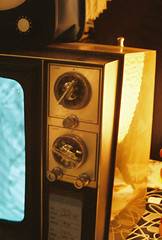Found this on 42nd St., literally. Obviously run over by a taxi. What shd I do with it? FYI, not mine. Won't power on. http://twitpic.com/7hfv1q
— Jim Hirshfield (@jimhirshfield) November21, 2011
As you can see, the glass wasn't just cracked - as frequently happens when an iPhone is dropped - but it was shattered. There were the tiniest of glass shards dropping from this device. I carefully picked it up and carried it by the metal band to my office. I figured I'd charge it up and see if I could identify the owner. It wouldn't charge. And then it occurred to me that I might be shorting out the circuitry because it was wet due to the rain from the night before.
So I wrapped it up and brought it home where I dried it out with the help of some desiccant we had in the basement. I left the iPhone in some Tupperware full of this stuff for a few days. I also ordered some tools and parts to see if I could replace the back glass, and the front (actually called the digitizer and LCD). Then on the next weekend, I took the iPhone apart:
iPhone 4 in pieces. This is the one I found shattered on 42nd St a few weeks ago. http://pic.twitter.com/LNVNv5mW
— Jim Hirshfield (@jimhirshfield) December10, 2011
Getting all the glass and grime off it wasn't easy, but in the end, I succeeded and was surprised that most of the guts looked like they were intact.
By yesterday, all the spare parts had arrived and I was able to re-assemble the phone. YouTube is a great resource with many "how to" videos. I followed this one to disassemble and reassemble the iPhone:
And I was able to easily find the parts I needed through Amazon. $63 spent. Well worth the expense to geek out on a project like this.
Let's see if I can put it all back together again. New back and front glass for iPhone 4. http://pic.twitter.com/3Gg1tVbH
— Jim Hirshfield (@jimhirshfield) December10, 2011
New face on the iPhone http://pic.twitter.com/04pLqDZe
— Jim Hirshfield (@jimhirshfield) December10, 2011
Motherboard and speaker unit installed #iphone4 #geekrepair http://pic.twitter.com/nhEOUKyT
— Jim Hirshfield (@jimhirshfield) December10, 2011
Motherboard wired up. Battery in. New glass back goes on next. #iphone #repair http://pic.twitter.com/u8nR0Dkn
— Jim Hirshfield (@jimhirshfield) December10, 2011
After charging the iPhone for a little bit, I was able to get to the home screen (there was no screen lock passcode needed). From there, I opened a few apps like Twitter and picture gallery, and was pretty sure I had the owners name. To be sure, I opened up the email app and found a non-personal email to the owner from Amazon. Within the email, I clicked on the "to" field (obviously, the email was sent to the iPhone's owner) and found the owner's email address, full name, and telephone number. The telephone number was likely the number associated with this iPhone - or perhaps a new iPhone.
Hmm...good sign? Iphone is booting up and now charging. Geeks rejoice. #iphone4 #repair http://pic.twitter.com/xz8xUNBL
— Jim Hirshfield (@jimhirshfield) December10, 2011
I suspected that the owner had bought a new iPhone since it took me 3 weeks from finding the pulverized device until I got it repaired. So I called the number, and he picked up.
I confirmed it was him, introduced myself, and asked him if he had lost an iPhone. He had (duh!). I told him the whole story - he had no idea where he lost it, or the circumstances. So he was surprised and very interested in the details - even though he had a new iPhone. I think he was mostly relieved to know what happened and to come to closure.
I offered to meet him and hand it off. He thanked me and said I could keep it. Now I'm struggling with how to use an iPhone 4 as a glorified iPod Touch with a SIM chip that's obviously been marked as lost/stolen. Might have to jailbreak it.
By late this afternoon, I couldn't even get it to boot up. I'm starting to suspect that Apple or AT&T have disabled it. I might just have a $63 brick on my hands.





















